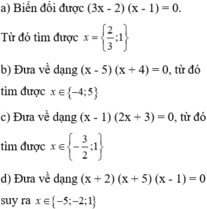
Những câu hỏi liên quan
Giải các phương trình sau:a)
2
x
3
x
−
2
3
x
−
1
3
x
−
2
;
b)
2
x
−
5
x
+...
Đọc tiếp
Giải các phương trình sau:
a) 2 x 3 x − 2 = 3 x − 1 3 x − 2 ;
b) 2 x − 5 x + 2 = x 2 − 5 x ;
c) x − 1 2 x + 1 + 2 x = 2 ;
d) x + 2 3 − 9 x + 2 = 0 .
Giải các phương trình sau
a)(x-1)^2-(x+1)^2=2(x-3)
b)x^2-9=(x-3)(5x+2)
c)(2x+3)^2-3(x-4)(x+4)=(x-2)^2
d)x^2+4x^2-9x-36=0
a: \(\Leftrightarrow x^2-2x+1-x^2-2x-1=2x-6\)
=>2x-6=-4x
=>6x=6
hay x=1
b: \(\Leftrightarrow\left(x-3\right)\left(x+3\right)-\left(x-3\right)\left(5x+2\right)=0\)
\(\Leftrightarrow\left(x-3\right)\left(x+3-5x-2\right)=0\)
=>(x-3)(-4x+1)=0
=>x=3 hoặc x=1/4
c: \(\Leftrightarrow4x^2+12x+9-3\left(x^2-16\right)-x^2+4x-4=0\)
\(\Leftrightarrow3x^2+16x+5-3x^2+48=0\)
=>16x+53=0
hay x=-53/16
d: \(\Leftrightarrow x^3+4x^2-9x-36=0\)
\(\Leftrightarrow\left(x+4\right)\left(x^2-9\right)=0\)
hay \(x\in\left\{-4;3;-3\right\}\)
Đúng 0
Bình luận (0)
b)x^2-9=(x-3)(5x+2)
\(\Leftrightarrow\left(x-3\right)\left(x+3\right)-\left(x-3\right)\left(5x+2\right)=0\)
\(\Leftrightarrow\left(x-3\right)\left(x+3-5x-2\right)=0\)
\(\Leftrightarrow\left(x-3\right)\left(1-4x\right)=0\)
\(\Rightarrow\left\{{}\begin{matrix}x-3=0\\1-4x=0\end{matrix}\right.\left\{{}\begin{matrix}x=0+3\\x=1:4\end{matrix}\right.\left\{{}\begin{matrix}x=3\\x=\dfrac{1}{4}\end{matrix}\right.\)
Đúng 0
Bình luận (7)
\(a,\left(x-1\right)^2-\left(x+1\right)^2=2\left(x-3\right)\\ \Leftrightarrow x^2-2x+1-x^2-2x-1=2x-6\\ \Leftrightarrow-4x-2x=-6\\ \Leftrightarrow-6x=-6\\ \Leftrightarrow x=1\)
\(b,x^2-9=\left(x-3\right)\left(5x+2\right)\\ \Leftrightarrow\left(x-3\right)\left(x+3\right)-\left(x-3\right)\left(5x+2\right)=0\\ \Leftrightarrow\left(x-3\right)\left(x+3-5x-2\right)=0\\ \Leftrightarrow\left(x-3\right)\left(-4x+1\right)=0\\ \Leftrightarrow\left[{}\begin{matrix}x=3\\x=\dfrac{1}{4}\end{matrix}\right.\)
\(c,\left(2x+3\right)^2-3\left(x-4\right)\left(x+4\right)=\left(x-2\right)^2\\ \Leftrightarrow4x^2+12x+9-3\left(x^2-16\right)=x^2-4x+4\\ \Leftrightarrow4x^2+12x+9-3x^2+48-x^2+4x-4=0\\ \Leftrightarrow16x+53=0\\ \Leftrightarrow x=\dfrac{-53}{16}\)
\(d,x^3+4x^2-9x-36=0\\ \Leftrightarrow x^2\left(x+4\right)-9\left(x+4\right)=0\\ \Leftrightarrow\left(x^2-9\right)\left(x+4\right)=0\\ \Leftrightarrow\left(x-3\right)\left(x+3\right)\left(x+4\right)=0\\ \Leftrightarrow\left[{}\begin{matrix}x=3\\x=-3\\x=-4\end{matrix}\right.\)
Đúng 1
Bình luận (0)
Giải phương trình sau:
a) \(\sqrt{4x+20}-3\sqrt{5+x}+\dfrac{4}{3}\sqrt{9x+45}=6\)
b) \(\dfrac{1}{2}\sqrt{x-1}-\dfrac{3}{2}\sqrt{9x-9}+24\sqrt{\dfrac{x-1}{64}}=-17\)
c) \(2x-x^2+\sqrt{6x^2-12x+7}=0\)
d) \(\left(x+1\right)\left(x+4\right)-3\sqrt{x^2+5x+2}=6\)
a: Ta có: \(\sqrt{4x+20}-3\sqrt{x+5}+\dfrac{4}{3}\sqrt{9x+45}=6\)
\(\Leftrightarrow2\sqrt{x+5}-3\sqrt{x+5}+4\sqrt{x+5}=6\)
\(\Leftrightarrow3\sqrt{x+5}=6\)
\(\Leftrightarrow x+5=4\)
hay x=-1
b: Ta có: \(\dfrac{1}{2}\sqrt{x-1}-\dfrac{3}{2}\sqrt{9x-9}+24\sqrt{\dfrac{x-1}{64}}=-17\)
\(\Leftrightarrow\dfrac{1}{2}\sqrt{x-1}-\dfrac{9}{2}\sqrt{x-1}+3\sqrt{x-1}=-17\)
\(\Leftrightarrow\sqrt{x-1}=17\)
\(\Leftrightarrow x-1=289\)
hay x=290
Đúng 1
Bình luận (0)
giải phương trình :
a, \(\left(x+1\right)\sqrt{x+8}=x^2+x+4\)
b, \(\left(2x+7\right)\sqrt{2x+7}=x^2+9x+7\)
c, \(\left(3x+1\right)\sqrt{x^2+3}=3x^2+2x+3\)
c.
\(\Leftrightarrow x^2+3-\left(3x+1\right)\sqrt{x^2+3}+2x^2+2x=0\)
Đặt \(\sqrt{x^2+3}=t>0\)
\(\Rightarrow t^2-\left(3x+1\right)t+2x^2+2x=0\)
\(\Delta=\left(3x+1\right)^2-4\left(2x^2+2x\right)=\left(x-1\right)^2\)
\(\Rightarrow\left[{}\begin{matrix}t=\dfrac{3x+1-x+1}{2}=x+1\\t=\dfrac{3x+1+x-1}{2}=2x\end{matrix}\right.\)
\(\Leftrightarrow\left[{}\begin{matrix}\sqrt{x^2+3}=x+1\left(x\ge-1\right)\\\sqrt{x^2+3}=2x\left(x\ge0\right)\end{matrix}\right.\)
\(\Leftrightarrow\left[{}\begin{matrix}x^2+3=x^2+2x+1\left(x\ge-1\right)\\x^2+3=4x^2\left(x\ge0\right)\end{matrix}\right.\)
\(\Leftrightarrow x=1\)
Đúng 2
Bình luận (0)
a.
Đề bài ko chính xác, pt này ko giải được
b.
ĐKXĐ: \(x\ge-\dfrac{7}{2}\)
\(2x+7-\left(2x+7\right)\sqrt{2x+7}+x^2+7x=0\)
Đặt \(\sqrt{2x+7}=t\ge0\)
\(\Rightarrow t^2-\left(2x+7\right)t+x^2+7x=0\)
\(\Delta=\left(2x+7\right)^2-4\left(x^2+7x\right)=49\)
\(\Rightarrow\left[{}\begin{matrix}t=\dfrac{2x+7-7}{2}=x\\t=\dfrac{2x+7+7}{2}=x+7\end{matrix}\right.\)
\(\Leftrightarrow\left[{}\begin{matrix}\sqrt{2x+7}=x\left(x\ge0\right)\\\sqrt{2x+7}=x+7\end{matrix}\right.\)
\(\Leftrightarrow\left[{}\begin{matrix}x^2-2x-7=0\left(x\ge0\right)\\x^2+12x+42=0\left(vn\right)\end{matrix}\right.\)
\(\Rightarrow x=1+2\sqrt{2}\)
Đúng 2
Bình luận (0)
Bài 1:giải các phương trình sau:
a) (x-3).(x+7)=0 b) (x-2)^2+(x-2).(x-3)=0 c)x^2-5x+6=0
Bài 2:giải các phương trình chứa ẩn ở mẫu sau:
a)x/x+1-1=3/2x b)4x/x-2-7/x=4
Bài 3:giải phương trình sau
a)2x^2-5x-7=0 b)1/x^2-4+2x/x-2=2x/x+2
giúp mình với,mình đang cần gấp
Mình khuyên bạn thế này :
Bạn nên tách những câu hỏi ra
Như vậy các bạn sẽ dễ giúp
Và cũng có nhiều bạn giúp hơn !
Bài 1.
a) ( x - 3 )( x + 7 ) = 0
<=> x - 3 = 0 hoặc x + 7 = 0
<=> x = 3 hoặc x = -7
Vậy S = { 3 ; -7 }
b) ( x - 2 )2 + ( x - 2 )( x - 3 ) = 0
<=> ( x - 2 )( x - 2 + x - 3 ) = 0
<=> ( x - 2 )( 2x - 5 ) = 0
<=> x - 2 = 0 hoặc 2x - 5 = 0
<=> x = 2 hoặc x = 5/2
Vậy S = { 2 ; 5/2 }
c) x2 - 5x + 6 = 0
<=> x2 - 2x - 3x + 6 = 0
<=> x( x - 2 ) - 3( x - 2 ) = 0
<=> ( x - 2 )( x - 3 ) = 0
<=> x - 2 = 0 hoặc x - 3 = 0
<=> x = 2 hoặc x = 3
Bài 2.
a) \(\frac{x}{x+1}-1=\frac{3}{2}x\)
ĐKXĐ : x khác -1
<=> \(\frac{x}{x+1}-\frac{x+1}{x+1}=\frac{3}{2}x\)
<=> \(\frac{-1}{x+1}=\frac{3x}{2}\)
=> 3x( x + 1 ) = -2
<=> 3x2 + 3x + 2 = 0
Vi 3x2 + 3x + 2 = 3( x2 + x + 1/4 ) + 5/4 = 3( x + 1/2 )2 + 5/4 ≥ 5/4 > 0 ∀ x
=> phương trình vô nghiệm
b) \(\frac{4x}{x-2}-\frac{7}{x}=4\)
ĐKXĐ : x khác 0 ; x khác 2
<=> \(\frac{4x^2}{x\left(x-2\right)}-\frac{7x-14}{x\left(x-2\right)}=\frac{4x^2-8x}{x\left(x-2\right)}\)
=> 4x2 - 7x + 14 = 4x2 - 8x
<=> 4x2 - 7x - 4x2 + 8x = -14
<=> x = -14 ( tm )
Vậy phương trình có nghiệm x = -14
Xem thêm câu trả lời
a) Giải phương trình: x^2+9x^2/(x+3)^2=40 b) Tìm m sao cho phương trình:(m-1)x+3m-2=0 có nghiệm duy nhất thỏa mãn: x lớn hơn hoặc bằng 1
a) Ta có: \(x^2+\dfrac{9x^2}{\left(x+3\right)^2}=40\)
\(\Leftrightarrow\dfrac{\left(x^2+3x\right)^2+9x^2}{\left(x+3\right)^2}=40\)
\(\Leftrightarrow x^4+6x^3+9x^2+9x^2=40\left(x+3\right)^2\)
\(\Leftrightarrow x^4+6x^3+18x^2=40\left(x^2+6x+9\right)\)
\(\Leftrightarrow x^4+6x^3+18x^2-40x^2-240x-360=0\)
\(\Leftrightarrow x^4+6x^3-22x^2-240x-360=0\)
\(\Leftrightarrow x^4+2x^3+4x^3+8x^2-30x^2-60x-180x-360=0\)
\(\Leftrightarrow x^3\left(x+2\right)+4x^2\left(x+2\right)-30x\left(x+2\right)-180\left(x+2\right)=0\)
\(\Leftrightarrow\left(x+2\right)\left(x^3+4x^2-30x-180\right)=0\)
\(\Leftrightarrow\left(x+2\right)\left(x^3-6x^2+10x^2-60x+30x-180\right)=0\)
\(\Leftrightarrow\left(x+2\right)\left[x^2\left(x-6\right)+10x\left(x-6\right)+30\left(x-6\right)\right]=0\)
\(\Leftrightarrow\left(x+2\right)\cdot\left(x-6\right)\left(x^2+10x+30\right)=0\)
mà \(x^2+10x+30>0\forall x\)
nên \(\left(x+2\right)\left(x-6\right)=0\)
\(\Leftrightarrow\left[{}\begin{matrix}x+2=0\\x-6=0\end{matrix}\right.\Leftrightarrow\left[{}\begin{matrix}x=-2\\x=6\end{matrix}\right.\)
Vậy: S={-2;6}
Đúng 4
Bình luận (1)
b) Ta có: (m-1)x+3m-2=0
\(\Leftrightarrow\left(m-1\right)x=2-3m\)
\(\Leftrightarrow x=\dfrac{2-3m}{m-1}\)
Để phương trình có nghiệm duy nhất thỏa mãn \(x\ge1\) thì \(\dfrac{2-3m}{m-1}\ge1\)
\(\Leftrightarrow\dfrac{2-3m}{m-1}-1\ge0\)
\(\Leftrightarrow\dfrac{2-3m-\left(m-1\right)}{m-1}\ge0\)
\(\Leftrightarrow\dfrac{2-3m-m+1}{m-1}\ge0\)
\(\Leftrightarrow\dfrac{-4m+3}{m-1}\ge0\)
hay \(\dfrac{3}{4}\le m< 1\)
Vậy: Để phương trình (m-1)x+3m-2=0 có nghiệm duy nhất thỏa mãn \(x\ge1\) thì \(\dfrac{3}{4}\le m< 1\)
Đúng 1
Bình luận (0)
Giải các phương trình sau:
a) x²+4x+3=0
b)x²+3x-2=0
c)-3x²+5x+8=0
d)9x²-6x+1=0
\(b,x^2+3x-2=0\\ \Delta=3^2-4.1.\left(-2\right)=17\\ =>\left[{}\begin{matrix}x_1=\dfrac{-3+\sqrt{17}}{2}\\x_2=\dfrac{-3-\sqrt{17}}{2}\end{matrix}\right.\)
Mấy câu còn lại mình giải rồi
Đúng 1
Bình luận (1)
a: =>(x+1)(x+3)=0
=>x=-1 hoặc x=-3
b: Δ=3^2-4*1*(-2)=9+8=17>0
=>Phương trình có hai nghiệm pb là:
\(\left\{{}\begin{matrix}x_1=\dfrac{-3-\sqrt{17}}{2}\\x_2=\dfrac{-3+\sqrt{17}}{2}\end{matrix}\right.\)
c: =>3x^2-5x-8=0
=>3x^2-8x+3x-8=0
=>(3x-8)(x+1)=0
=>x=8/3 hoặc x=-1
d: =>(3x-1)^2=0
=>3x-1=0
=>x=1/3
Đúng 0
Bình luận (0)
giải phương trình
a, 2(x+5)=x2+5x
b, 4x2-25=(2x-5)(2x+7)
c,x3+x=0
d, x3-9x2+6x+16
a, 2(x+5)=x2+5x
=> 2x+10=x2+5x
=> 0=x2+5x-2x-10
=> x2+3x-10=0
=> x2+5x-2x-10=0
=> x(x+5)-2(x+5)=0
=> (x-2)(x+5)=0
=> x-2 =0 hoặc x+5 =0
=> x=2 hoặc x=-5
b, 4x2-25=(2x-5)(2x+7)
=> (2x)2-52=(2x-5)(2x+7)
=> (2x-5)(2x+5) - (2x-5)(2x+7)=0
=> (2x-5)(2x+5-2x-7)=0
=> (2x-5)(-2)=0
=> 2x-5=0
=> 2x=5
=> x =2,5
c, x3+x=0
=>x(x2+1)=0
=> x=0 hoặc x2+1=0
Mà x2+1 >= 1 nên x=0
d, Hình như là thiếu đề
Đúng 0
Bình luận (0)
a,=2x+10=x2+5x
=-x2-2x-5x+10=0
=-x2-7x+10=0
Delta=(-7)2-4.-1.10=89
x1=7+căn89/2 x2=7-căn 89/2
CÁC CÂU KHÁC TỰ GIẢI NHA bạn
Đúng 0
Bình luận (0)
\(a.\Leftrightarrow2\left(x+5\right)-x\left(x+5\right)=0\Leftrightarrow\left(x+5\right)\left(2-x\right)\Leftrightarrow\orbr{\begin{cases}x=-5\\x=2\end{cases}}\)
\(b.\Leftrightarrow\left(2x-5\right)\left(2x+5\right)-\left(2x-5\right)\left(2x+7\right)=0\Leftrightarrow\left(2x-5\right)\left(2x+5-2x-7\right)\Leftrightarrow-2\left(2x-5\right)=0\Leftrightarrow2x-5=0\Leftrightarrow x=\frac{5}{2}\)
\(c.\Leftrightarrow x\left(x^2+1\right)=0\Leftrightarrow\orbr{\begin{cases}x=0\\x^2=-1\end{cases}}\)loại trường hợp x^2=-1 vài bình phương luôn lớn hơn 0 vậy x=0
\(d.\Leftrightarrow x^3+x^2-10x^2-10x+16x+16=0\Leftrightarrow x^2\left(x+1\right)-10x\left(x+1\right)+16\left(x+1\right)=0\)
\(\Leftrightarrow\left(x+1\right)\left(x^2-10x+16\right)=0\Leftrightarrow\left(x+1\right)\left(x^2-2x-8x+16\right)=0\Leftrightarrow\left(x+1\right)\left[x\left(x-2\right)-8\left(x-2\right)\right]=0\)
\(\Leftrightarrow\left(x+1\right)\left(x-2\right)\left(x-8\right)=0\Leftrightarrow x=-1,x=2hayx=8\)
Chọn mình nha chúc bạn học tốt
Đúng 0
Bình luận (0)
a) \(2\left(x^2-2x\right)+\sqrt{x^2-2x-3}-9=0\)
b) \(3\sqrt{2+x}-6\sqrt{2-x}+4\sqrt{4-x^2}=10-3x\)
c) Cho phương trình: \(\sqrt{x}+\sqrt{9-x}=\sqrt{-x^2+9x+m}\)
+) Giải phương trình khi m=9
+) Tìm m để phương trình có nghiệm
a, ĐK: \(x\le-1,x\ge3\)
\(pt\Leftrightarrow2\left(x^2-2x-3\right)+\sqrt{x^2-2x-3}-3=0\)
\(\Leftrightarrow\left(2\sqrt{x^2-2x-3}+3\right).\left(\sqrt{x^2-2x-3}-1\right)=0\)
\(\Leftrightarrow\left[{}\begin{matrix}\sqrt{x^2-2x-3}=-\dfrac{3}{2}\left(l\right)\\\sqrt{x^2-2x-3}=1\end{matrix}\right.\)
\(\Leftrightarrow x^2-2x-3=1\)
\(\Leftrightarrow x^2-2x-4=0\)
\(\Leftrightarrow x=1\pm\sqrt{5}\left(tm\right)\)
Đúng 1
Bình luận (0)
b, ĐK: \(-2\le x\le2\)
Đặt \(\sqrt{2+x}-2\sqrt{2-x}=t\Rightarrow t^2=10-3x-4\sqrt{4-x^2}\)
Khi đó phương trình tương đương:
\(3t-t^2=0\)
\(\Leftrightarrow\left[{}\begin{matrix}t=0\\t=3\end{matrix}\right.\)
\(\Leftrightarrow\left[{}\begin{matrix}\sqrt{2+x}-2\sqrt{2-x}=0\\\sqrt{2+x}-2\sqrt{2-x}=3\end{matrix}\right.\)
\(\Leftrightarrow\left[{}\begin{matrix}2+x=8-4x\\2+x=17-4x+12\sqrt{2-x}\end{matrix}\right.\)
\(\Leftrightarrow\left[{}\begin{matrix}x=\dfrac{6}{5}\left(tm\right)\\5x-15=12\sqrt{2-x}\left(1\right)\end{matrix}\right.\)
Vì \(-2\le x\le2\Rightarrow5x-15< 0\Rightarrow\left(1\right)\) vô nghiệm
Vậy phương trình đã cho có nghiệm \(x=\dfrac{6}{5}\)
Đúng 1
Bình luận (0)
c, ĐK: \(0\le x\le9\)
Đặt \(\sqrt{9x-x^2}=t\left(0\le t\le\dfrac{9}{2}\right)\)
\(pt\Leftrightarrow9+2\sqrt{9x-x^2}=-x^2+9x+m\)
\(\Leftrightarrow-\left(-x^2+9x\right)+2\sqrt{9x-x^2}+9=m\)
\(\Leftrightarrow-t^2+2t+9=m\)
Khi \(m=9,pt\Leftrightarrow-t^2+2t=0\Leftrightarrow\left[{}\begin{matrix}t=0\\t=2\end{matrix}\right.\Leftrightarrow\left[{}\begin{matrix}9x-x^2=0\\9x-x^2=4\end{matrix}\right.\Leftrightarrow\left[{}\begin{matrix}x=0\left(tm\right)\\x=9\left(tm\right)\\x=\dfrac{9\pm\sqrt{65}}{2}\left(tm\right)\end{matrix}\right.\)
Phương trình đã cho có nghiệm khi phương trình \(m=f\left(t\right)=-t^2+2t+9\) có nghiệm
\(\Leftrightarrow minf\left(t\right)\le m\le maxf\left(t\right)\)
\(\Leftrightarrow-\dfrac{9}{4}\le m\le10\)
Đúng 1
Bình luận (0)






























